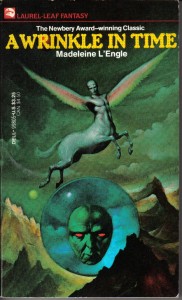Sci-Fi Classics
I loved science fiction when I was a young teen – especially short stories about time travel, which usually had surprise endings. In Arthur C Clarke’s All the Time in the World, a man freezes time a second before a nuclear blast; in A Sound of Thunder, by Ray Bradbury, the death of an insect changes the course of history. I still have my old copy of Bradbury’s Golden Apples of the Sun; the Corgi paperback cost me 65 cents new in 1970 (about the hourly rate for raspberry picking in my summer holidays). A Wrinkle in Time by Madeleine L’Engle was a novel ahead of its time in 1960 (it was rejected 26 times by publishers). Its plot combines wormholes and angels and has a classic ending: a giant disembodied alien brain is defeated by love. L’Engle liked to tackle grand themes, as she said:
You have to write the book that wants to be written. And if the book will be too difficult for grown-ups, then you write it for children.
